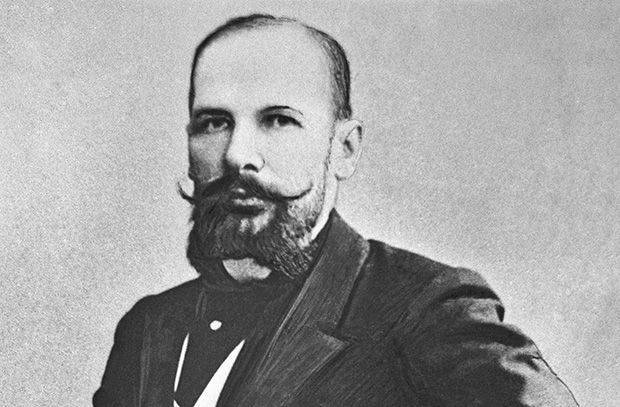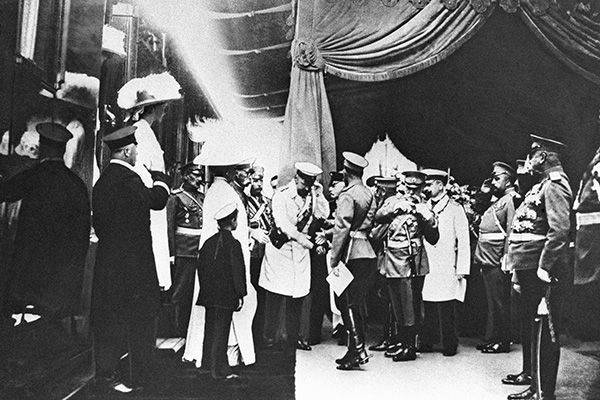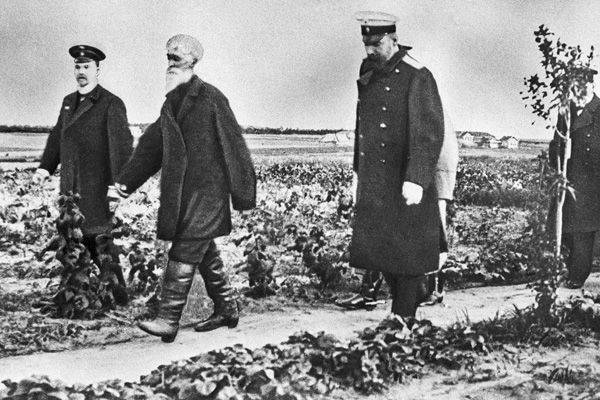Jump into the void

Stolypin's agrarian reform was the last attempt to modernize tsarist Russia.
Like many events a hundred years ago, the results of Stolypin’s reforms still serve as a bone of contention for publicists. Perhaps the main motive in these disputes is not historicalbut political. If the reforms were successful, then Russia was moving along the right path and, if not for a radical change in the economic system as a result of the October Revolution, would have achieved socio-economic prosperity. If the destruction of the community was a mistake, then collective farms, largely copying the structure of the rural community, were the most natural form of economic units in the countryside, and collectivization was largely justified.
No, I'm not Byron, I'm different ...
Peter Stolypin was born on April 2 of the year 1862 in Dresden, where his mother was visiting. This is rarely remembered, but he was Mikhail Lermontov’s second cousin — his grandfather, Dmitri Alekseevich Stolypin, and the poet’s grandmother, Elizaveta Alekseevna Stolypin, were siblings. His father, Arkady Dmitrievich, became famous for his heroic participation in the defense of Sevastopol, served as governor of Eastern Rumelia after the Russian-Turkish war of 1876 – 1877. Mother, Natalya Mikhailovna, was the daughter of Mikhail Dmitrievich Gorchakov, who commanded the troops in the Crimea in the last period of the Crimean War. In a word, the boy was in a sense condemned to make a public career.
The family often moved, and Peter studied at the gymnasium first in Vilna, and then in Orel. After graduating from high school, he entered the natural department of the Faculty of Physics and Mathematics of St. Petersburg University. He married a man of his environment unusually early - in the 22 of the year, as a result of a tragic and romantic story: his elder brother Mikhail was killed in a duel and bequeathed to his brother to marry his bride Olga Neydgardt, who was a maid of honor under Empress Maria Fedorovna. Olga (who, by the way, was Suvorov’s great-granddaughter) was three years older than Peter, but the marriage was successful: she lived with him until his death and gave birth to six children.
After graduating from university, Peter Arkadyevich was enlisted in the service of the Department of Agriculture and Rural Industry of the Ministry of State Property, and after a few years he was appointed leader of the nobility of the Kovno district and chairman of the Kovno congress of conciliators. In the Kovno province, he will live 14 for years, and it is at this time that he will acquire important work experience with the peasants - working, among other things, on increasing yields and introducing new varieties of grain crops.
Servant to the Tsar
In 1902, Stolypin received an appointment to the post of the Grodno governor, being the youngest among the heads of provinces in that period - he was only 40 years old. The province, however, was zashtatnoy, but he managed to prove himself: the Minister of Internal Affairs Plehve sent him a draft simplified Zemstvo self-government in the western provinces to recall and was very pleased with a wise comment on this document. Stolypin knew well that in the western provinces the economic and political elite were mostly Poles, and the peasant and petty-bourgeois classes were represented by Lithuanians, Byelorussians and Jews. So that, on the one hand, not to exacerbate national contradictions, and on the other - not to take away their main meaning from the elections, he proposed to create a college of electors who would elect publics. The board could include peasants and even Jews.
Speaking to the Grodno landowners, Stolypin gave them his views on ways to improve the lives of the peasants: he offered to save them from the intersection where the land of the same family was scattered in several separate areas, and settle them in the hamlets - integral areas where they could put the house. Subsequently, this idea will become part of his famous reform. Having proved himself to be a subtle politician and caring for the prosperity of the population of the province, Stolypin nevertheless was tough when he considered it necessary - so he mercilessly suppressed revolutionary sentiments among Polish youth.
Just a year later, Stolypin received a transfer to the post of Saratov governor. It must be said that he didn’t like the idea of moving from a quiet Grodno - even though the Stolypin ancestral lands were in the Saratov province. Saratov province was one of the foremost provinces of the country. In contrast to the northwestern lands of the empire, zemstvos and active social life existed here. The county was considered to be restless - peasant unrest arose here and there, and Stolypin had a good reputation for stopping them. He repeatedly negotiated with an angry mob, addressing her with harsh words without fear. Nicholas II in letters to the Saratov governor expressed his thanks to him.
It was this combination of will and loyalty that made him the best candidate for the post of Minister of the Interior, although Peter Arkadyevich did not always support the sovereign's decisions. So, Stolypin did not approve of the war that began soon with Japan - he believed that the need to send soldiers to the far front, where they would fight for ideas that they do not understand, contributes to their susceptibility to socialist agitation. The post of interior minister, by the way, was not a gift at all: two of Stolypin’s three closest predecessors in this post, Sipyagin and Plehve, were killed by terrorists, and the third, Prince Svyatopolk-Mirsky, allowed the tragedy of “bloody Sunday”. At first Stolypin refused - and changed his decision only after the words of Nicholas II: “I ask you to accept this post, I order you”. The head of the Interior Ministry was the second influential minister after the prime minister; however, in the same year, Stolypin also became the head of the government as a result of the resignation of the former head of the cabinet of ministers, Goremykin, who failed to find a compromise in the dialogue with the first State Duma in Russia.

Fighting the community
Let us leave Stolypin’s internal political activity in this post, for which he had to pay with his life, to remain outside the scope of the article. We are more interested in the attempt made by him to improve the welfare of the most numerous social group in the country - the peasantry. At that time, rural residents made up four-fifths of the empire’s population. However, the role of the peasants in the economy fell steadily - in 1906, agriculture provided only a little over half of the country's income, being in deep crisis. Paradoxically, it was the abolition of serfdom. And it was not for nothing that Nekrasov described it as a broken chain:
"The great chain was broken,
Broke up and hit, -
One end on the master,
Another - on the peasant.
The fact is that the peasants were released virtually without land: they had to buy out their land from the landowner and, in order not to starve, they had to borrow money from usurers or (from 1883) on the Peasant Land Bank. However, there was nothing for the majority of peasants to repay debts - discontent with the situation was clearly manifested during the First Russian Revolution, when mass demonstrations began in the villages. The authorities were forced to abolish the redemption payments and forgive the arrears - but this measure did not bring instant relief. At the beginning of the twentieth century, the free Russian peasant lived noticeably worse than half a century ago his father, who was “in the fortress” of the master.
Stolypin saw a way to improve the situation in the village in several measures. First of all, he was going to motivate the peasants to leave the peasant community, which played a controversial role. On the one hand, it was for the peasants a system of social protection and at the same time an instrument of self-government. Distributing the land according to the number of members of each family that cultivated one or another plot, it, on the one hand, did not allow the poorest peasants to die of hunger, on the other hand, prevented financial stratification in the village, conserving the patriarchal order, and thus hampered the development of capitalism in the village . The latter circumstance was largely due to the low efficiency of agriculture. The emergence of rich rural households was also hampered by the interleaving - another product of community activity: in an effort to give the peasants a land of about the same quality, the community gave them plots in different places.
It was the destruction of the community that Stolypin considered as the first step. According to a decree issued by the State Council 9 in November 1906, with the surprisingly modest title “On the addition of certain resolutions of the current law concerning peasant land tenure,” the peasants received the right to demand the separation of their household from the community as personal property: “Every householder who owns communal land can at any time to demand the strengthening of the part of the said land due to him for his personal property. ” Having allocated his inter-strip plot from the communal land fund, the householder could immediately demand that it be replaced with “a corresponding plot, but if possible to one place”. Thanks to such a solid plot (it was called a cut or a farm - if it had a family house), the peasant turned into an individual owner of the land, a sort of farmer. Moving to the farm, the peasant was forced to fight for the existence of their own labor, not relying on the support of fellow villagers; it was supposed to encourage him to increase productivity, including by attracting employees. Such a strong owner, as Stolypin believed, with time was to turn into a new pillar of the state.

As another measure aimed at the destruction of the community, Stolypin considered the resettlement of land-poor peasants in the peripheral regions of the country, where they could acquire an almost free plot — first of all, Siberia, Central Asia, the North Caucasus, and Kazakhstan were subject to internal colonization. The state allocated to immigrants means for moving and settling in a new place. Peter Arkadyevich planned to take away its power from the community, establishing two different “societies” instead: the first, the land, would retain the right to dispose of the land, and the second, the township, would become a unit of local government. However, this reform item was never implemented.
The reform was difficult for Stolypin. We must not forget that after the 1905 – 1907 revolution, the State Duma appeared in the country through which it was now necessary to carry out all the bills. And in the Duma, the peasants' interests were represented by the faction of the Trudoviks, who nominated their own project, which was based on confiscating landowner lands and nationalizing the whole land fund of the empire - unlike the Stolypin project, which guaranteed the inviolability of landowners. Stolypin spent a lot of time and nerves before the State Duma and the State Council gave the go-ahead to the project of his reform, which 14 of June 1910 of the year was approved by the king.
Did not have enough time?
As you know, Pyotr Arkadyevich did not even see the immediate results of his reform - he was shot dead by terrorist Bogrov in the Kiev 1 Opera House on September 1911 of the year. But what were the results of the measures prepared by him? Can they be considered successful?
There is no doubt that the reform really had a huge impact on the life of the peasantry, spurring the development of capitalist relations in the countryside: wealthy peasants-kulaks consolidated large tracts of land in their hands, using hired labor to increase them, strengthened the domestic market . At the same time, the reform could not be called progressive in the sense that it substantially facilitated the transfer of land to those who were ready to efficiently process it, because the reform did not affect the vast landlord land. And this is not surprising if we recall that the goal of the reform was largely political: it had to reduce social tensions in the country.
Avron Avrekh, a well-known Soviet researcher of Stolypin’s activity, believed that the agrarian reform failed neither economically nor politically - and it is difficult to disagree with this. In the conditions of poor development of rural infrastructure, poor agronomic methods, the Russian “farmer”, who owned tenths of 5 – 7 of land, could not significantly improve the efficiency of his individual farm. The number of kulaks before the revolution did not exceed 4 – 5% of the rural population; therefore, they never turned into a support for the regime and significant economic power. The fact that in ten years - from 1905 to 1916 a year - only about a third (3 million) of householders in those provinces where the reform was carried out is eloquent. This means that the agrarian reform failed to destroy the community.
Stolypin did not succeed in forcing the peasants to forget about a far more delicious piece than their miserable tithes, the landlords' lands: this was clearly manifested in the squatters that began after the February revolution. The “internal colonization” suffered a failure: already in 1908 – 1909, 1,3 million people left their familiar spots, dreaming about their own allotment in underdeveloped regions of the country, but soon many began to return - cultivating the land in the wild corners of the country turned out to be much more difficult than at home. .
Perhaps the results of the reform would have been more impressive if it had not been for the ensuing war and two revolutions. However, some historians find it difficult to even trace the positive dynamics of agriculture, which would reliably be the result of reform. Thus, the former director of the Institute of Russian History of the Russian Academy of Sciences, Andrei Sakharov, noted that encouraging facts such as the increase in the volume of marketable grain and the rising standard of living in the Russian countryside in the prewar years, which liberal writers often point to, could actually be due to several other favorable factors - industrial growth in Russia, the growth of world grain prices, the absence of crop failures, as well as the abolition of redemption payments, which we discussed above.
Be that as it may, Peter Stolypin’s agrarian reform was the last attempt at the social modernization of Russia before the 1917 revolutions of the year. The lack of a quick effect was largely responsible for the growth of social tension, which led to tragic upheavals and a change of power in the country.
Information